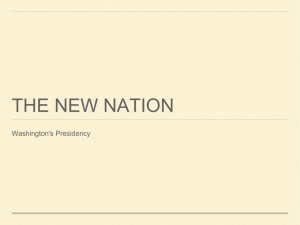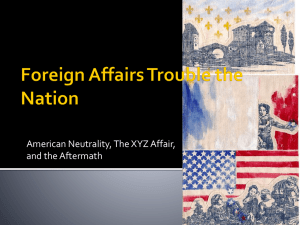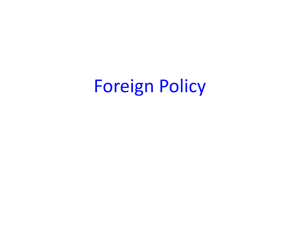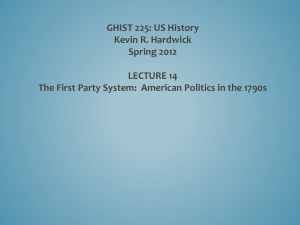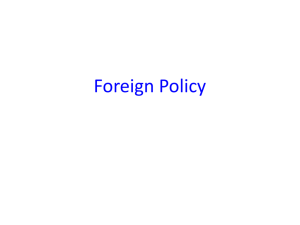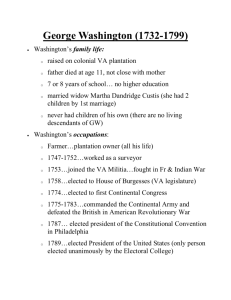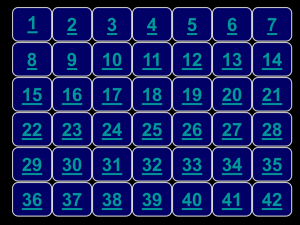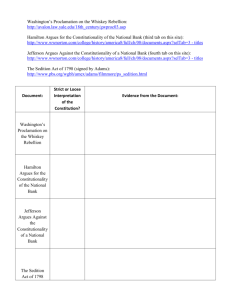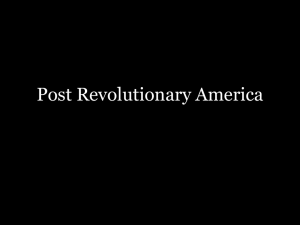Early Republic: Washington & Adams - US History Presentation
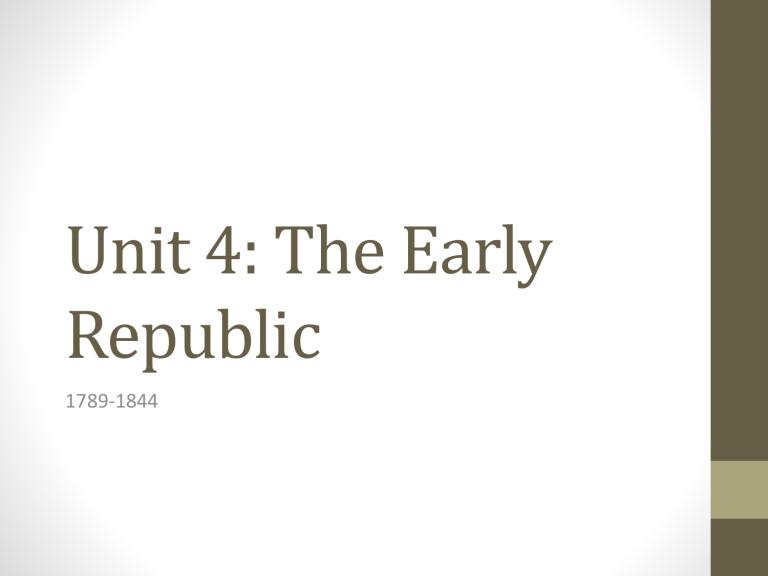
Unit 4: The Early
Republic
1789-1844
In this Unit…
• Chapter 9: Launching a New Republic
• Chapter 10: The Jefferson Era
• Chapter 11: National and Regional Growth
Chapter 9:
Launching a New
Republic
Lesson 1: Washington’s Presidency
Essential Question
What traditions and tensions first appeared in the early years of the new country?
Vocabulary
• John Jay: first chief justice of the U.S. Supreme
Court
• Cabinet: group of executive department heads that serve as the president’s chief advisors
• Inaugurate: to formally swear in or induct into office
• Precedent: an example that becomes standard practice
• Tariff: tax on imported goods
Key Question
What were some challenges faced by George
Washington?
Washington’s New
Government
• First presidential election was held in 1789
• Washington was elected
• The runner-up John Adams became vicepresident
• Inauguration took place in New York City, the capital
• Every action set a precedent
• “His Excellency” vs. “Mr. President”
Assembling a Cabinet
• Needed to create departments to help run the country
• State
• Treasury
• War
• Justice
• Postal Service
• Heads of these departments are chosen by president
• Called the cabinet
The Nation’s Finances
• WAR DEBTS
• Other countries: Spain, Netherlands, France
• Citizens
• Soldiers
• By 1789- $52 million
• Other countries wouldn’t do business with a country who did not pay off debts
• HAMILTON’S PROPOSALS
• Pay off all war debt
• Raise government income and profits
• Create a national bank
Building a Strong Government
• TARIFFS
• Taxes on imports
• Encourages national business
• Increased income
• NATIONAL BANK
• Kept money in a safe location
• Could give loans
• Could issue money
Key Question
What were some challenges faced by George
Washington?
Chapter 9:
Launching a New
Republic
Lesson 2: Challenges to the New Government
Vocabulary
• Battle of Fallen Timbers: 1794 battle between Native Americans and American forces
• Treaty of Greenville: 1795 treaty in which 12 Native American tribes ceded control of much of Ohio and Indiana to the U.S. government
• Whiskey Rebellion: 1794 protest against the government’s tax on whiskey by backcountry farmers
• Jay’s Treaty: Agreement that ended the dispute with Britain over
American shipping during the French Revolution
• Pinckney’s Treaty: 1795 treaty with Spain allowing U.S. commercial use of the Mississippi River
Key Question
How did Washington establish authority at home and avoid wars abroad?
Problems at Home
• Nation needed peace
• Trouble between Appalachian Mountains and Mississippi River
• Spain, Britain, the U.S. and Native Americans all claimed land
• Battles in the Northwest Territory
• August 20, 1794
• 2,000 Native Americans meet 1,000 American troops
• In Ohio
• Native Americans were defeated
• Called the Battle of Fallen Timbers
• Native Americans knew they had lost the Northwest Territory
• 12 troops signed the Treaty of Greenville that gave up their land to the U.S.
Problems at Home
• Washington put a tax on whiskey
• Farmers were furious
• 1794 Whiskey Rebellion occurred
• Pennsylvania
• 13,000 soldiers put down the rebellion
• Rebels fled
• Proved Washington could enforce laws
Problems Abroad
• America was still very involved with Europe
• Events in Europe had effects in America
• FRENCH REVOLUTION
• 1789
• Financial problems led to rebellions
• People wanted freedom and equality like America
• Executed the king and queen
• Britain, Holland, and Spain joined the war against the revolution
• What should the U.S. do?
• France had helped during our revolution
• Britain was America’s best trading partner
• U.S. remained neutral
• Britain began to seize cargo from American ships
Problems Abroad
• Jay’s Treaty
• Britain agreed to pay damages from cargo ships
• Britain left the Ohio River Valley but still kept its fur trade in
America
• Many frontier settlers were angry
• Pinckney’s Treaty
• Americans could use Mississippi River
• U.S. goods could be stored in New Orleans
• U.S. and Spain agreed on a border for Florida
• Americans began to feel safer because issues abroad were being taken care of
Key Question
How did Washington establish authority at home and avoid wars abroad?
Chapter 9:
Launching a New
Republic
Lesson 3: The Federalists in Charge
Vocabulary
• John Adams: Second President of the United States
• Alien and Sedition Acts: Series of four laws enacted in 1798 to reduce the political power of recent immigrants
• States’ rights: Idea that the states have certain rights that the federal government cannot overrule
• Nullification: idea that a state could cancel a federal law within a state
• Foreign Policy: Relations with the governments of other nations
• Political Party: Group of people that tries to promote its ideas and influence government
• Aliens: Immigrants who are not yet citizens
• Sedition: Stirring up rebellion against a government
Key Question
How did Federalists dominate politics under
President John Adams?
Washington Retires
• Washington decided that 8 years in office (2 terms) was enough
• As President, Washington tried to promote national unity
• Many criticized his decision to remain neutral in the French
Revolution
• Washington’s Final Concerns
• Dealt with foreign policy
• Advised nation to remain neutral and avoid permanent alliances
• Cautioned against letting political differences divide the nation
• At the end of Washington’s terms, Americans were very divided
• Strong Central Government vs. Weak Central Government
Growth of Political Parties
• Differences led to creation of political parties
• Thomas Jefferson and John Madison led the Democratic-Republican
Party
• Emphasis on democracy and republican system
• Limited power of national government
• Strict interpretation
• Farmers and workers supported this party
• Today is the Democratic Party
• Alexander Hamilton led the Federalist Party
• Belief in Strong National Government
• Loose interpretation
• Merchants and manufacturers supported this party
• Based off of the supporters of the ratification of the U.S. Constitution
John Adams’s Administration
• Adams chosen as 2 nd president
• Jefferson became VP
• Issues with France
• Washington left with strong tensions
• France seized and harassed over 300 US ships
Alien and Sedition Acts
• New immigrants often supported Democratic-Republican party
• Congress was dominated by Federalists
• Passed the Alien and Sedition Acts
• For immigrants that weren’t citizens yet
• Could not get citizenship for 5-14 years
• President could arrest or deport any suspicious immigrants during wartime
• Sedition: stirring up rebellion against a government
• This was also outlawed
Peace with France
• Adams opened talks up with France again
• Agreed to stop all naval attacks
• All ships could sail in peace
Key Question
How did Federalists dominate politics under
President John Adams?

